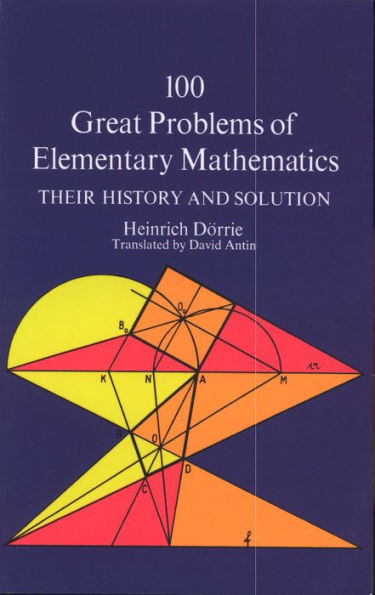by Heinrich Dorrie"

Introduction: "100 Great Problems of Elementary Mathematics" by Heinrich Dorrie is a timeless collection that immerses readers in the world of elementary mathematics, revealing the beauty and depth of this foundational branch of mathematics. In this review, we'll journey through Dorrie's compilation of captivating problems, proofs, and mathematical insights.
A Celebration of Mathematical Beauty:
Historical Context: Dorrie introduces each problem with historical context, transporting readers to different eras and civilizations where these mathematical challenges first emerged. This historical backdrop provides a rich context for understanding the significance of each problem.
Problem Diversity: The book encompasses a wide range of mathematical topics, from geometry and number theory to algebra and combinatorics. Each problem is carefully selected to showcase a unique aspect of elementary mathematics, making it both educational and intellectually stimulating.
Elegant Proofs: Dorrie doesn't just present the problems; he offers elegant solutions and proofs. His explanations are clear, concise, and often accompanied by diagrams or illustrations, making complex concepts accessible to all readers.
Practical Applications and Beyond:
Educational Resource: "100 Great Problems" serves as an invaluable educational resource for students, teachers, and math enthusiasts alike. It encourages readers to think critically and creatively, fostering a deeper understanding of mathematical principles.
Problem-Solving Skills: The book hones problem-solving skills and promotes a mindset of exploration and discovery. Readers can engage with the problems at their own pace, gaining confidence in tackling mathematical challenges.
Accessible to All:
No Advanced Mathematics Required: Dorrie's book is designed to be accessible to readers with a basic understanding of mathematics. You don't need advanced mathematical knowledge to appreciate the elegance of these problems and their solutions.
Timeless Appeal: Despite being originally published in the mid-20th century, the problems and concepts explored in this book remain relevant and inspiring today. Mathematics, after all, is a timeless language.
Conclusion: "100 Great Problems of Elementary Mathematics" is a testament to the enduring allure of mathematics. Heinrich Dorrie's selection of problems and accompanying explanations reveals the depth and beauty inherent in elementary mathematical concepts. Whether you're a student seeking to deepen your mathematical understanding or a math enthusiast looking for intellectual stimulation, this book offers a rewarding journey through the world of elementary mathematics. Dorrie's work reminds us that mathematics is not just a subject; it's an art form that invites us to explore, question, and appreciate the elegance of the mathematical universe.

Comments